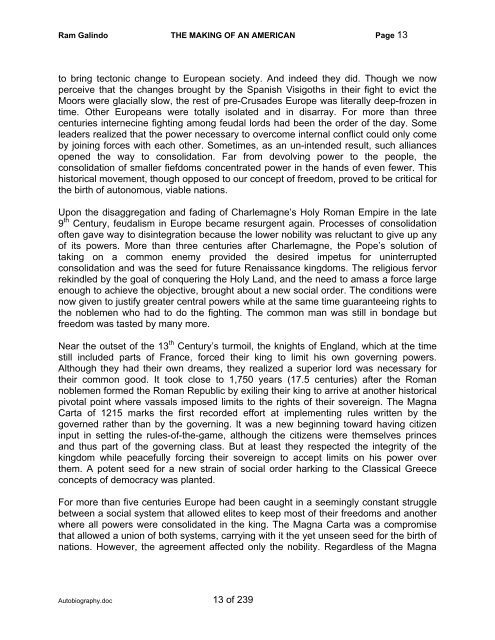Autobiography - The Galindo Group
Autobiography - The Galindo Group
Autobiography - The Galindo Group
You also want an ePaper? Increase the reach of your titles
YUMPU automatically turns print PDFs into web optimized ePapers that Google loves.
Ram <strong>Galindo</strong> THE MAKING OF AN AMERICAN Page 13<br />
to bring tectonic change to European society. And indeed they did. Though we now<br />
perceive that the changes brought by the Spanish Visigoths in their fight to evict the<br />
Moors were glacially slow, the rest of pre-Crusades Europe was literally deep-frozen in<br />
time. Other Europeans were totally isolated and in disarray. For more than three<br />
centuries internecine fighting among feudal lords had been the order of the day. Some<br />
leaders realized that the power necessary to overcome internal conflict could only come<br />
by joining forces with each other. Sometimes, as an un-intended result, such alliances<br />
opened the way to consolidation. Far from devolving power to the people, the<br />
consolidation of smaller fiefdoms concentrated power in the hands of even fewer. This<br />
historical movement, though opposed to our concept of freedom, proved to be critical for<br />
the birth of autonomous, viable nations.<br />
Upon the disaggregation and fading of Charlemagne’s Holy Roman Empire in the late<br />
9 th Century, feudalism in Europe became resurgent again. Processes of consolidation<br />
often gave way to disintegration because the lower nobility was reluctant to give up any<br />
of its powers. More than three centuries after Charlemagne, the Pope’s solution of<br />
taking on a common enemy provided the desired impetus for uninterrupted<br />
consolidation and was the seed for future Renaissance kingdoms. <strong>The</strong> religious fervor<br />
rekindled by the goal of conquering the Holy Land, and the need to amass a force large<br />
enough to achieve the objective, brought about a new social order. <strong>The</strong> conditions were<br />
now given to justify greater central powers while at the same time guaranteeing rights to<br />
the noblemen who had to do the fighting. <strong>The</strong> common man was still in bondage but<br />
freedom was tasted by many more.<br />
Near the outset of the 13 th Century’s turmoil, the knights of England, which at the time<br />
still included parts of France, forced their king to limit his own governing powers.<br />
Although they had their own dreams, they realized a superior lord was necessary for<br />
their common good. It took close to 1,750 years (17.5 centuries) after the Roman<br />
noblemen formed the Roman Republic by exiling their king to arrive at another historical<br />
pivotal point where vassals imposed limits to the rights of their sovereign. <strong>The</strong> Magna<br />
Carta of 1215 marks the first recorded effort at implementing rules written by the<br />
governed rather than by the governing. It was a new beginning toward having citizen<br />
input in setting the rules-of-the-game, although the citizens were themselves princes<br />
and thus part of the governing class. But at least they respected the integrity of the<br />
kingdom while peacefully forcing their sovereign to accept limits on his power over<br />
them. A potent seed for a new strain of social order harking to the Classical Greece<br />
concepts of democracy was planted.<br />
For more than five centuries Europe had been caught in a seemingly constant struggle<br />
between a social system that allowed elites to keep most of their freedoms and another<br />
where all powers were consolidated in the king. <strong>The</strong> Magna Carta was a compromise<br />
that allowed a union of both systems, carrying with it the yet unseen seed for the birth of<br />
nations. However, the agreement affected only the nobility. Regardless of the Magna<br />
<strong>Autobiography</strong>.doc 13 of 239


